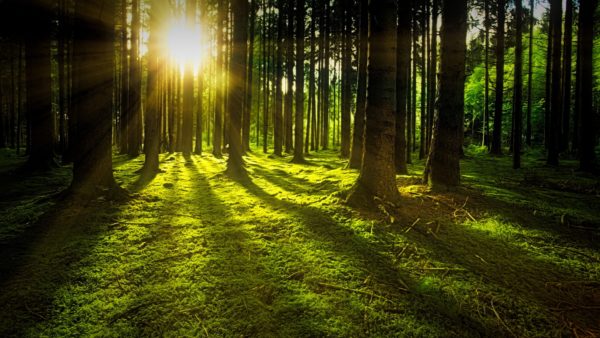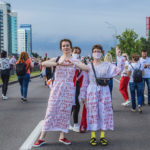Covid-19 is affecting not only individuals, but also entire communities. Life is changing while we are adapting to new social rules. Are we completely aware of the effects on our existence? With a poetic narrative, Adam introduces us to a personal reflection on his own experience as an ex-pat in those Covid times in the USA.
 The lowest sounds travel the farthest. I am spending Wednesday afternoon in the woods, as I usually do, collecting chanterelle mushrooms for supper. The woods are always humid and fertile this time of year. Squirrels scramble about in the leaves, birds argue constantly. Every green thing grasps its desperate way to the hot sun. This afternoon, the languid summer quiet is broken in a different way. Subwoofer sounds roll down the hills and through the trees. The strange basslines and crackling megaphones are actually a welcome intrusion. It’s been a long time since I’ve heard distant music.
The lowest sounds travel the farthest. I am spending Wednesday afternoon in the woods, as I usually do, collecting chanterelle mushrooms for supper. The woods are always humid and fertile this time of year. Squirrels scramble about in the leaves, birds argue constantly. Every green thing grasps its desperate way to the hot sun. This afternoon, the languid summer quiet is broken in a different way. Subwoofer sounds roll down the hills and through the trees. The strange basslines and crackling megaphones are actually a welcome intrusion. It’s been a long time since I’ve heard distant music.
The local Baptists took advantage of isolation time and built a church nearby, which, by the sound of things, is open for the business of worship. The new sounds first surprise me, and then please me, but after an hour or so, something like resentment sets in. I take my mushrooms home and start a béchamel, my temper just popping along with the oil.
The Baptists are singing at church. It’s been almost five months since I’ve gone to church, longer since I’ve sung along to live music. I can’t tell what I’m more angry about, the public risks Americans take with Coronavirus, or the fact that I can’t take those risks myself. The Anglican Church is cautious, and may not open for months. The bishops just sent out a letter to let us know that even if we did open up, there would be no choir, no wine, and no tea and biscuits after church.
One part of me is proud that there are some responsible leaders around here. I have Native friends who have been aching for a powwow or anything to gather their scattered community together. We have been reassuring each other for months that it is better to wait longer, and have fewer missing when we do come back together. We have been saying it’s not right to try to honor elders by exposing them to risks. But as I slice the mushrooms, I feel childishly upset. I grew up in Australia, part of me is an Australian kid desperate for anything to feel normal. That part of me wants to shake one of the bishops until their pointy hat falls off and tell them “No tea-and-biscuits IS no local community!” But as there are no bishops in my kitchen at the moment, I content myself with chopping the mushrooms rougher than necessary.
 The fact is, there are far more important rituals than a night out singing or a morning in church that we’ve had to digitize or go without. A couple of friends died these past months, there was no funeral for one, and the other was delayed. I downloaded zoom in a hurried attempt to join an online memorial, organized by friends who wanted just to share stories. Technical issues kept me from hearing anything properly, it was one of the most isolating days of isolation. I was lucky to be able to drop everything and go to a memorial service when a month later one was held in person. I have never been so relieved to be at a memorial, but it felt so strange. The family rented a huge field so that people could come while still social distancing. The 20 of us seemed practically huddled together over the gulf of empty space. There were leftover macaroni and fried fish for each of us to have taken several days’ worth of meals home. The kids shot videos with everyone, streamed on social media, and announced every like and comment to us. As unexpected as her death was, a quiet memorial service with just a few people was even less expected.
The fact is, there are far more important rituals than a night out singing or a morning in church that we’ve had to digitize or go without. A couple of friends died these past months, there was no funeral for one, and the other was delayed. I downloaded zoom in a hurried attempt to join an online memorial, organized by friends who wanted just to share stories. Technical issues kept me from hearing anything properly, it was one of the most isolating days of isolation. I was lucky to be able to drop everything and go to a memorial service when a month later one was held in person. I have never been so relieved to be at a memorial, but it felt so strange. The family rented a huge field so that people could come while still social distancing. The 20 of us seemed practically huddled together over the gulf of empty space. There were leftover macaroni and fried fish for each of us to have taken several days’ worth of meals home. The kids shot videos with everyone, streamed on social media, and announced every like and comment to us. As unexpected as her death was, a quiet memorial service with just a few people was even less expected.
I’m lucky that when my grandmother caught Covid, she got better. I’m grateful every day to miss out on that ritual. But funerals and serious affairs aren’t the only rituals we are missing. I can’t go visit her each week, and she rarely remembers to charge her phone. Each dinner unshared, each good morning left unsaid, each coffee not shared is one more little ritual to be half-done over zoom, or done without. I suppose that’s why some people find going without football games and church services unbearable. When one’s not used to doing without, holding on to something seems not just necessary, but profound.
I never wanted to be the kind of person who says “sending good thoughts.” I want to be there for whichever friends I’m geographically in front of so much that they don’t doubt our friendship when I disappear. I want to be available so much that it’s strained my oldest and closest friendships, as I’d rather promise to visit soon than call regularly. I thought I was experienced at changing circumstances and finding new rituals. I thought I knew a phone call wasn’t enough. Doing without certain rituals has been hard. Digitizing some of them has been impossible. I hope I’ve learned how wrong I was about calling friends not being good enough. I overcook the spaghetti from thinking.
I call dad over, and am grateful we share a house during this time of isolation. I’m used to loud dinners, with loud people. Today, it’s quiet. Dad opens the window to hear the frogs sing. I forgot to put on tea. One less ritual, my fault. Our forks make high clinking noises over the frog bass voices as we twirl our overcooked mushroom alfredo. I’d rather have a loud dinner, but to all of you who are reading, I’ll send good thoughts.
Adam Geller
August 2020

Photo by StartupStockPhotos – Pixabay
 Previous Post
Previous Post Next Post
Next Post